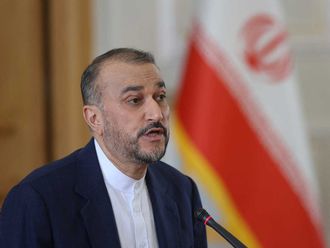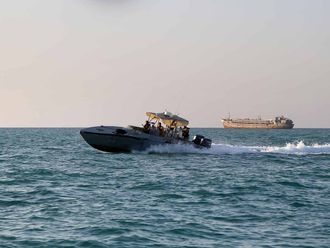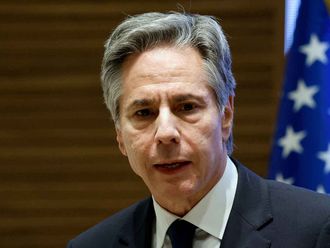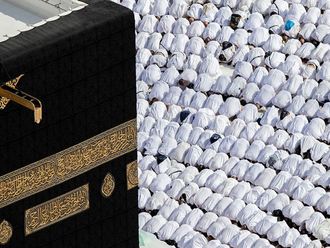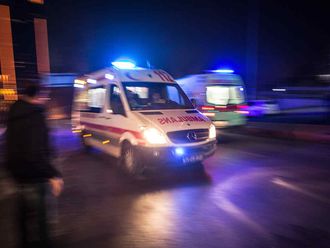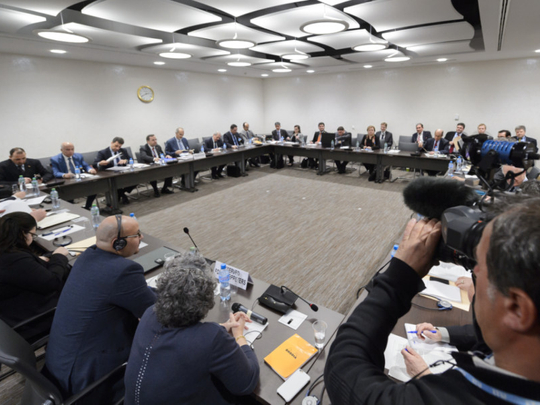
Beirut: Talks in Geneva to explore a solution to the Syria crisis are due to resume on April 10 after they wrapped up earlier in the week with several important decisions being reached by the two superpowers overseeing the negotiations: Russia and the United States. US Secretary of State John Kerry was in Moscow last week to discuss Syria with his Russian counterpart Sergei Lavrov and Russian President Vladimir Putin.
All involved agreed that the second round of Geneva III was “positive” and might lead to direct talks between the government delegation and the opposition in two weeks.
US President Barack Obama seems serious about reaching a breakthrough on Syria, before he leaves the White House next January.
Obama doesn’t want history to say that the greatest human tragedy since the Second World War played out during his presidency and that he left office without at least putting Syria on the right track.
To that end, his Secretary of State is engaged in serious diplomacy with the Russians, aimed first at “controlling and reducing” the violence in Syria — via the cessation of hostilities that has held since last February — and, subsequently, through the start of a serious political process based on UN Security Council resolution 2254 (UNSCR 2254).
For its part, the US has agreed to let Moscow have its way by breaking the Saudi sway over the Syrian opposition delegation.
At present, the entire team is Saudi-backed, with Moscow insisting that some of the negotiators are representatives of “terrorist groups” (in reference to Ahrar Al Sham of northern Syria and Jaysh Al Islam of the Damascus countryside). This will change next April, with politicians like Saleh Al Muslem of the Kurdish Democratic Party (PYD), human rights lawyer Haitham Manaa, and the communist ex-deputy prime minister of Syria, Qadri Jamil being ushered into the talks. In reciprocation, Moscow has agreed to pressure its allies in Damascus to engage in serious talk about a “transitional period” that will ultimately lead to “power sharing with the Syrian opposition and not regime change”.
If the two great powers get their way, direct talks between both delegations might be possible in April.
During the first two rounds of talks, the rival delegations did not sit in the same room but conducted the talks via UN mediator Staffan De Mistura.
Additionally, Kerry and Lavrov have now agreed on a timetable for Syria.
According to UNSCR 2254, the ultimate goal of the political process is to bring the two sides to the negotiating table and for them to create a “representative non-sectarian government” within six months.
The UN resolution also sets a timeframe of 17 months for the drafting of a new constitution and holding elections (without specifying whether they are presidential, parliamentary, or both).
The elections need to be free and democratic, and monitored by the international community, with full participation of all Syrians — those living in the country and refugees across the diaspora.
The opposition is eyeing early presidential elections in late 2017.
The government insists that the parliamentary elections will take place as planned in mid-April 2016, regardless of Geneva outcomes, and the presidential vote will only happen when its next meant to — in the summer of 2021.
Probably, both sides will be forced to bend from their stated positions and early presidential elections might happen sometime in 2018-2019.
Damascus has no intention of calling off parliamentary elections scheduled for April 13, and might delay sending its delegation to Geneva as four members of the team are contesting the elections.
If a deal is struck between Washington and Moscow, the Syrian parliament, once convened, could be dissolved soon after since none of the opposition figures are running for office — not even the Moscow-backed figures.
The Americans and Russians are planning to hold a second round of talks in April and a third round in early May, so as to pave the way to a power-sharing government in June 2016.
Although nothing concrete has been mentioned in this regard, behind closed doors, the idea is to give 10 seats to the government, 10 to the opposition, and 10 to political independents.
In Moscow this week, Kerry and Lavrov agreed that a new Syrian constitution needs to see the light in August — three months before the US elections, making use of whatever momentum is left in the Obama administration to bring peace to Syria. They made no mention of how this charter will be drafted via an elected or appointed Constitutional Assembly.
As the latest round of Syrian talks wrapped up, UN mediator Staffan de Mistura put forth a list of commonalities between the two Syrian delegations, preferring to build upon similarities rather than differences.
Both the government and the opposition insist that combatting Daesh is a priority. Both sides reject the partition of Syria and both want foreign fighters ejected from the Syrian battlefield. Both have said no to foreign intervention and both pledged to respect the sovereignty and independence of Syrian lands, and to preserve state institutions, including the Syrian army.
De Mistura has also penned a document outlining “principles of the political process” to serve as an informal roadmap for the next round of talks in early April. It will only be presented to the UN Security Council once approved by both delegations.
The 12-point document fails to mention the future and fate of President Bashar Al Assad but it makes reference both to Geneva I, which calls for a transitional government body with full executive powers, and UNSCR 2254, which makes no mention whatsoever of the Syrian strongman.
It tries to set out something for each delegation, deliberately investing in “positive ambiguity.”
De Mistura gave assurances to the government delegation that the start of a “transitional period” does not indicate a move to topple the current regime but plans for “sharing power with it”. So far, neither Damascus nor Tehran have commented on the De Mistura document, but the Riyadh-backed opposition groups have officially welcomed it.


